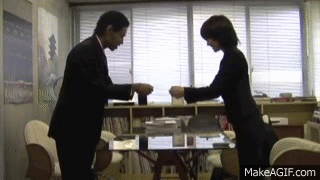Hi everyone!
I am over one-third of the way through my time in Japan, and the time has absolutely flown. I've well and truly settled into a routine now, though until I learn more of the language I couldn't say I'm at home! One place that does feel familiar is The Office, because I work in an English-speaking environment filled with mostly British and Australian lawyers and bilingual Japanese support staff. That said, there have been a few surprises about working in Japan which I'm going to share with you now.
1. Business cards
The one piece of information I knew about Japanese business culture was "something something business cards". Before I left to come here, multiple people gave me their two cents on business card practice and then this was reconfirmed at our "etiquette training" as soon as I arrived. Hold your business card ("meishi") in two hands with the Japanese language side facing up and pointed towards the other person. Swap business cards. Study the contents of the business card with an "interested look on your face" and make small talk about the contents if possible. Easy huh?

I was lucky enough to go to a preliminary meeting at the arbitrator's offices for one of our matters. I made sure I wore a suit, was ready to keep my mouth shut, brought lots of writing material, FORGOT TO BRING ANY BUSINESS CARDS.
Sigh, I try SO hard .....
When we first entered the room, only the opposition and his lawyer were present and I had to stand awkwardly to the side while everyone else slowly exchanged business cards one by one. I explained honestly that I didn't bring any. The arbitrator and his secretary then arrived, we had the meeting, and at the end I had to stand to the side yet again while everyone exchanged business cards with them.
Mr Darcy gets it:

I then lied and said that I'd run out. It didn't help - you're supposed to carry 100 business cards with you wherever you go.
I went to a networking event soon afterwards, and two Japanese women kindly explained the business card rules. Apparently, you should try and serve your business card underneath the other person's card, because that means you are being humble and polite. The other person will also try to swap their card underneath yours, so eventually it becomes a bit like:

2. "Lift Commander"
There is an interesting phenomenon that happens in the lifts at work, particularly for the "express lift" that goes directly up without stopping.
We all shuffle into the lift and then one person will always (I mean always) take up the position right next to the panel of buttons. I call this person the "Lift Commander".
The Lift Commander is in charge of pressing the "closing door" button as soon as the last person has entered the lift. We then stand silently, facing the direction of the door. The doors open and we shuffle out again. The Lift Commander honourably stays until last, holding the "door open" button until everyone has left. Only then will the Lift Commander leave.
I keep forgetting this unspoken rule: I'm very trigger happy when it comes to closing the doors...

...but then I'll also walk out of the lift first...

Lately I've been remembering though, and when I take on the role of Lift Commander, the Japanese people in the lift are noticably surprised and grateful. Sometimes I'll get a soft "arigato gozimasu" (thank you) or a teensy little bow as they leave. Just goes to show that they don't expect much from foreigners, but if you manage to do something right, Japanese people will be grateful!
3. "Career women" and power dressing
One thing I did know about Japanese business culture before coming over was the "salaryman". According to Wikipedia (I went there), salaryman "refers to a man whose income is salary based, particularly those working for corporations. It has gradually become accepted in Anglophone countries as a noun for a Japanese white-collar worker or businessman. The term salaryman refers exclusively to men".
This was the kind of image I had in mind:

I am over one-third of the way through my time in Japan, and the time has absolutely flown. I've well and truly settled into a routine now, though until I learn more of the language I couldn't say I'm at home! One place that does feel familiar is The Office, because I work in an English-speaking environment filled with mostly British and Australian lawyers and bilingual Japanese support staff. That said, there have been a few surprises about working in Japan which I'm going to share with you now.
1. Business cards
The one piece of information I knew about Japanese business culture was "something something business cards". Before I left to come here, multiple people gave me their two cents on business card practice and then this was reconfirmed at our "etiquette training" as soon as I arrived. Hold your business card ("meishi") in two hands with the Japanese language side facing up and pointed towards the other person. Swap business cards. Study the contents of the business card with an "interested look on your face" and make small talk about the contents if possible. Easy huh?

I was lucky enough to go to a preliminary meeting at the arbitrator's offices for one of our matters. I made sure I wore a suit, was ready to keep my mouth shut, brought lots of writing material, FORGOT TO BRING ANY BUSINESS CARDS.
Sigh, I try SO hard .....
When we first entered the room, only the opposition and his lawyer were present and I had to stand awkwardly to the side while everyone else slowly exchanged business cards one by one. I explained honestly that I didn't bring any. The arbitrator and his secretary then arrived, we had the meeting, and at the end I had to stand to the side yet again while everyone exchanged business cards with them.
Mr Darcy gets it:

I then lied and said that I'd run out. It didn't help - you're supposed to carry 100 business cards with you wherever you go.
I went to a networking event soon afterwards, and two Japanese women kindly explained the business card rules. Apparently, you should try and serve your business card underneath the other person's card, because that means you are being humble and polite. The other person will also try to swap their card underneath yours, so eventually it becomes a bit like:

2. "Lift Commander"
There is an interesting phenomenon that happens in the lifts at work, particularly for the "express lift" that goes directly up without stopping.
We all shuffle into the lift and then one person will always (I mean always) take up the position right next to the panel of buttons. I call this person the "Lift Commander".
The Lift Commander is in charge of pressing the "closing door" button as soon as the last person has entered the lift. We then stand silently, facing the direction of the door. The doors open and we shuffle out again. The Lift Commander honourably stays until last, holding the "door open" button until everyone has left. Only then will the Lift Commander leave.
I keep forgetting this unspoken rule: I'm very trigger happy when it comes to closing the doors...

...but then I'll also walk out of the lift first...

Lately I've been remembering though, and when I take on the role of Lift Commander, the Japanese people in the lift are noticably surprised and grateful. Sometimes I'll get a soft "arigato gozimasu" (thank you) or a teensy little bow as they leave. Just goes to show that they don't expect much from foreigners, but if you manage to do something right, Japanese people will be grateful!
3. "Career women" and power dressing
One thing I did know about Japanese business culture before coming over was the "salaryman". According to Wikipedia (I went there), salaryman "refers to a man whose income is salary based, particularly those working for corporations. It has gradually become accepted in Anglophone countries as a noun for a Japanese white-collar worker or businessman. The term salaryman refers exclusively to men".
This was the kind of image I had in mind:
The pleasant surprise for me was that there are quite a few business women around as well. From what I've heard, it is difficult being a woman in business in Japan and I wasn't sure what to expect. As Wikipedia continues, "The term salaryman refers exclusively to men; for women the term [is] career woman or, for lower prestige jobs office lady is used". I can tell the career women because they will be wearing a type of uniform of a black skirt suit and white shirt, with the collars opened up wide above the blazer collar. Apparently dressing formally in a suit signals to the world that she is a "career woman" and is to be taken seriously. Power dressing.
Whenever I see these women around work, I just want to go:


